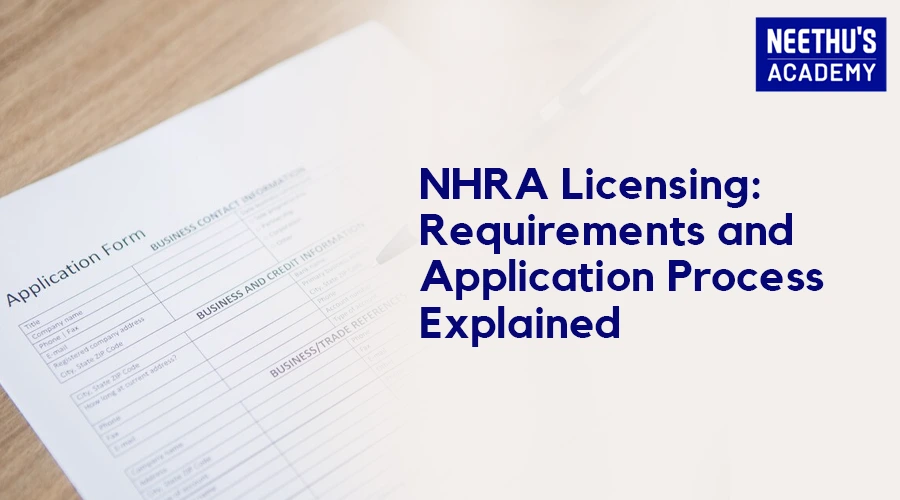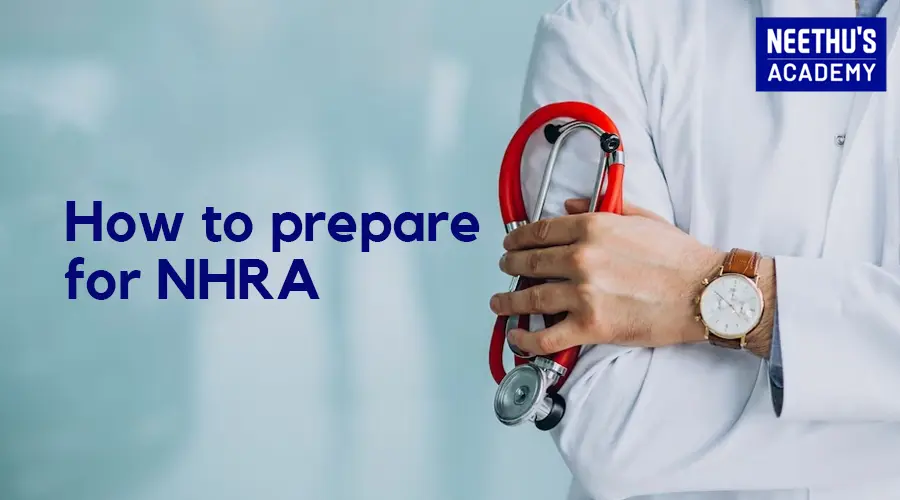NHRA Exam Syllabus: Key Areas and Study Strategies for Success
For those looking to practice in states like Bahrain, whose regulatory bodies ensure that the health care professionals meet certain standards, the NHRA exam is a critical milestone. Sufficient preparation before the exam is possible only if one understands the NHRA exam syllabus pretty well. Therefore, this blog shall serve as an all-inclusive NHRA syllabus guide. We have thus included key topics, study tips, and potential pitfalls for you to avoid.
The NHRA exam is one of those tests that test a candidate’s all-around knowledge and skills in health care. Key areas that have been classified under the NHRA exam will enable you to perform well while taking the exam but also become ready to face the challenges that lie ahead. This guide will break down the NHRA exam syllabus in finer detail and highlight critical topics, offering preparation strategies for success.
One thing you are expected to realize is that learning for the NHRA exam is not something you do spontaneously. It requires structured planning, disciplined studying, and constant reviewing on your part. Now that you work with efforts streamlined according to the NHRA syllabus breakdown, you can avoid pieces of content from piling up to familiarize yourself with.
Overview of the NHRA Exam Syllabus
NHRA Exam Syllabus is an organized framework that details the subjects and topics for which you would be tested. It encompasses all types of content, hence aiming to test not just your clinical knowledge but also your knowledge about healthcare ethics, legal requirements, and communication skills. It can thus be considered as a roadmap that guides one through all the necessary areas so that one can prepare himself or herself well.
The NHRA exam has different parts, each of which focuses on other health care practices and related aspects. These parts test theoretical and practical knowledge to ensure that the candidate is fully equipped to face the challenges health care provides effectively.
Why do you Need to Know the NHRA Syllabus?
Knowing the NHRA syllabus is important for several reasons.
Clarifies Exam Expectations: Knowing what’s covered in an exam helps you focus on what’s relevant.
Helps Prioritize Your Time: After selecting the most important topics under NHRA, you will be able to prioritize your time and focus more on tricky areas.
Reduces Stress: Awareness about the syllabus helps to reduce stress related to exams as one can trust the knowledge that is obtained about what to anticipate.
Helps Guide Your Resources: The syllabus helps decide on what type of resources will help you study and which practice tests will be more relevant to what content is included in the exam.
Key Areas in the NHRA Exam Syllabus
The NHRA exam will test the candidates on the various major domains of healthcare. Let us see the breakdown of major areas covered in the syllabus below:
Clinical Knowledge and Practice
This is one of the most important sections in the NHRA exam. You will be tested on your applications of medical knowledge in clinical settings. This includes:
- Patient assessment and diagnosis
- Medical treatment procedures
- Pharmacology
- Medical technologies and equipment
- Pathophysiology
For this part, try to understand what is written regarding medical conditions, treatments, and patient management. The ability to use the knowledge resourcefully in real-life scenarios will dictate your success.
Healthcare Ethics and Professionalism
Healthcare ethics consist of ideals on which healthcare practices are based. Some skills for navigating ethical dilemmas include:
- Informed consent
- Patient confidentiality and privacy
- Cultural sensitivity
- Medical ethics on the digital front end
A healthcare professional needs to have an understanding of the standards of ethics and professionalism expected in health care. During NHRA, one will learn the skills of balancing personal needs, legal requirements, and ethical considerations while maintaining a high level of professionalism.
Legal and Regulatory Framework
Healthcare professionals operate under laws and regulations drafted with the intent of protecting patients as well as the organization. As part of the NHRA exam syllabus, you are assessed on:
Local health-care laws and regulations
Legal requirements for licensure
- Rules for patient care
- Reporting and documentation of any adverse events occurring, whether it be through medical error or malpractice
- Safe working conditions
Familiarity with the legal and regulatory framework would ensure that you work safely and ethically within the scope of your role. This area requires in-depth knowledge about the regulations of jurisdiction and healthcare policies applicable to your field.
Communication Skills in Health Care
Effective communication is essential in health care. This area tests your ability to converse with a patient, the family, and a multidisciplinary team. Topics include:
Patient interviews and history-taking
Conveying medical information clearly and empathetically
- Healthcare Team Communication
- Cross-Cultural Communication
The healthcare provider needs to be able to convey intricate medical information in a manner that is easily understood and executed and in a sensitive fashion. Part of this portion of your learning will be on your verbal and non-verbal communication as a healthcare provider so do not forget to continue refining this often.
NHRA Exam Preparation Focus
Identify High-Yield Topics
While preparing for the NHRA exam, it is very essential to identify high-yield topics—those areas that are often tested or carry much weight in the examination. These include core clinical knowledge areas, ethical frameworks, and legal regulations. Identify those topics to be prioritized in your study schedule so that you will get maximum coverage of the most important material.
Develop a Study Plan Based on the NHRA Syllabus
A systematic plan for studies will help you prepare adequately for your exams. Your plan should be based directly on the NHRA syllabus guide with each subject divided into manageable sections. You should assign specific times to revision to ensure that you spend more time in difficult areas.
Important: Assign time for practice tests and self-assessment to track your progress. Regular assessment will help you hone your grasp and improve your strategies to take a test.
Use the NHRA Syllabus as a Checklist
Another good way of staying organized while preparing for the exams is by referring to the NHRA syllabus as a checklist. Once you study each topic mark it from the list. In this way, you will come to know which portion you have covered so far and what remains. It would also give you an idea of systematic preparation, meaning your preparation will not drift here and there but will follow a patterned process.
Common Mistakes to Avoid When Studying for the NHRA Exam
Overlooking Less Familiar Topics
Probably one of the common mistakes that the candidate makes is to avoid areas that he or she is not so familiar with. Yes, it may appeal to stick to familiar strengths, but the scope of the NHRA exam is wide, and failing to look through the less familiar areas may result in gaps in knowledge. Review all topics on the syllabus, including those that you hate going through.
Neglecting Practical Applications of Knowledge
An NHRA exam not only requires theoretical knowledge but also demonstrates how one would apply this knowledge practically. A mistake here is memorizing basic concepts instead of learning how to apply these concepts in clinical situations. Practice using case studies or scenarios that reflect actual healthcare settings.
Failure to Use the Syllabus as a Study Guide
Some candidates commit an error not to refer to the breakdown of the NHRA syllabus during their preparation. Use the syllabus as your first guide to make sure you fully cover all important areas and don’t leave out any significant study areas.
Conclusion
In a nutshell, knowledge of the NHRA exam syllabus is the key to passing it. Important areas in the NHRA exam must be given a special focus, and a detailed study plan based on the syllabus will increase the chances of success. Regular review of the content, practice tests, and consulting with experts will close the knowledge gap and sharpen skills.
Here, with Neethu’s Academy, you can sidestep common mistakes like ignoring topics that are less widely taught, or failing to see practical applications, so you can prepare in an organized manner before sitting for the exam.
The course is specifically designed for those looking for tailored coaching to help plan out the syllabus of NHRA and excel in the exam. Good luck!!
Frequently Asked Questions




